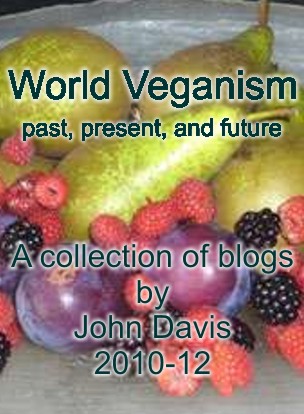May 2, 2012
A few days ago I went to Amazon books, just searched for 'vegan', and got 4,503 results. That sounds great, except that after looking thru dozens of pages all I could see were American cookbooks, finding any mention of the animals was very rare. One even said "Whether you go vegan for your health or the environment..." - it gives the impression that most Americans see veganism as just another health-food fad diet.
Veganism is not just about food. It is an ethical position which rejects any use of animals for any purpose, including clothing, research and entertainment, as well as diet. (Someone once described the term 'dietary vegan' as the equivalent of a 'secular Catholic'.)
So what do we call someone who only eats food entirely derived from plants, but still wears leather or even just wool? One increasingly common term is 'total vegetarian'.
Vegetarianism is a diet which may be adopted for reasons of health, ethics, the environment or religion.
The word 'vegetarian' was first used by a small group of people in the London, UK, area around 1840, but it only came into more common usage with the founding of The Vegetarian Society on September 30, 1847.
The Society was founded jointly by two distinct groups, one of which included eggs and dairy products in their diet, the other relied exclusively on food derived from plants. It was this latter group which first called themselves 'vegetarian' - people who just lived on vegetation - and much as some of us might like to return to that original meaning, common usage and dictionary listings will make that difficult.
The first objectives of the Society simply required members to 'abstain from the flesh of animals', leaving it to individuals to decide whether to use other animal products. Thus, from 1847, there was always more than one type of vegetarian.
Today we can define three common types:
- - Ovo-lacto-vegetarian (plant foods plus eggs/dairy) - still the most common form in the UK any many other countries.
- - Lacto-vegetarian (dairy but not eggs) - this is the predominant type of vegetarian in India, and therefore relevant around the world, where there are now significant numbers of vegetarians of Indian ethnicity.
- - Total-vegetarian - a term becoming increasingly common in the USA which is also helpful elsewhere, meaning a diet entirely of plant-foods - a total-vegetation-eater.
In the later 19th century there were attempts to use 'pure vegetarian' or 'strict vegetarian' to separate these from the eggs/dairy users, but they ended up just being used to describe anyone who was pure or strict about not eating flesh. It is possible that 'total vegetarian' could end up suffering the same misuse, but maybe we can avoid that by promoting it.
In 2011 the International Vegetarian Union conducted a ballot of 120 member organisations worldwide, and they agreed, by a 95% majority, to a new definition, consistent with everything above:
IVU defines vegetarianism as a diet of foods derived from plants, with or without eggs, dairy products, and/or honey.
The placing of the first comma is an important division. This definition does not consider why anyone becomes vegetarian, merely what they eat. There are, of course, many smaller variations as well as the three above, including whether honey is used.
Many vegetarians hold a variety of ethical positions, but there is no overall consistency due to the different reasons for becoming vegetarian, as well as the different types of vegetarians.
Vegan
The word 'vegan' was invented in the UK in 1944 to provide a name for the first Vegan Society. That Society's current definition:
Veganism denotes a philosophy and way of living which seeks to exclude - as far as is possible and practicable - all forms of exploitation of, and cruelty to, animals for food, clothing or any other purpose; and by extension, promotes the development and use of animal-free alternatives for the benefit of humans, animals and the environment.
Comparing that with item 3 above, we can say that a vegan follows a total vegetarian diet, but total vegetarians are not necessarily vegan.
The relevance of all this to vegans is that there has, for many years, been an increasing tendency for people who only eat plant foods to call themselves vegan, whilst continuing to wear leather shoes or use other animal products. This has been a particular trend in North America, and is very frustrating for those trying to promote genuine, fully ethical, veganism.
If the term 'total vegetarian' becomes more widely accepted, it could just prevent the word 'vegan' from continuing to decline into the same sort of confusion that overtook 'vegetarian'.
Of course we will continue to refer to 'vegan food', I do too because it's shorter than 'total vegetarian food', but if we can make them interchangeable then it could at least help to clarify that veganism is more than just food.
In the French language they have three terms - the original Wegetarien' dating back to 1878, then in 1920 they added Wegetalien' for an exclusive plant-eater, only much later adding 'vegane' for those of an ethical persuasion.
We need this clarity in English... something between ovo-lacto and vegan. 'Total Vegetarian' fits - but will it catch on enough before it gets corrupted?
See the North American Vegetarian Society: 'What is a Vegetarian?'
- like most vegetarian organizations today, everything NAVS does is Total Vegetarian.
 John Davis
John Davis
